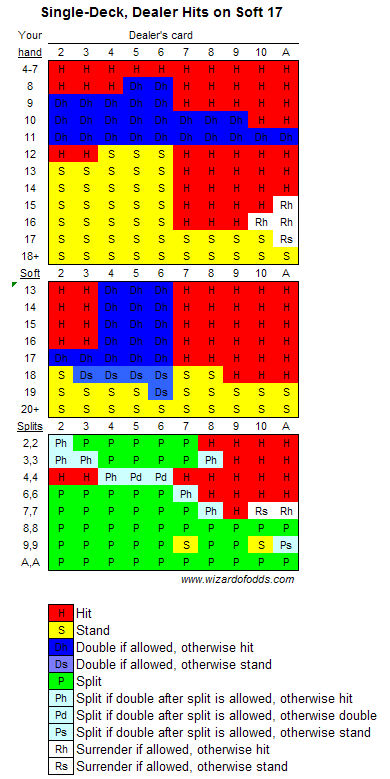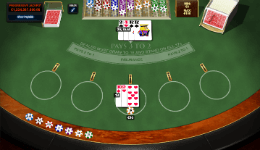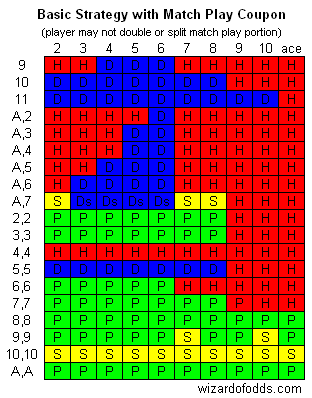Triple Match also wins the highest odds when Player’s initial 2 cards are the same rank as the Dealer’s upcard; VIEW RACK CARD Buster Blackjack Game Description. Exciting blackjack side bet that allows players to win odds-based payouts when a dealer busts. The amount of cards in the dealer’s busted hand determines the payout the player. One popular Blackjack variant that is available at a wide variety of online casinos is known as, ‘Match Play 21.’ However, despite the seeming popularity of this game many online players might be surprised (if they don’t normally frequent land-based casinos) not to find the game available. Triple Sevens Blackjack by Microgaming. Triple Sevens is available at some Microgaming-powered casinos and offers a progressive pot that pays $80,000 on average. The progressive pot drops once every year or so. To play for the huge prize or a portion of it, you need to place an optional side bet of $1. Blackjack side bets come in many shapes and sizes. Many traditional and online blackjack games have their own lineup of side bets. It would be impossible to come up with a complete list of side bets, though all blackjack side bet options generally fall under a few different categories.
- Blackjack Triple Match Results
- Blackjack Triple Match Auto Paint
- Blackjack Triple Match Game
- Blackjack Triple Match Games
- Blackjack Triple Match Game
- Blackjack Triple Match Meaning
Triple 7 ranks among the most popular blackjack variations out there because it combines the rules of the traditional casino-banked card game with a progressive side bet that can reward players with a massive jackpot. Creating this blackjack variation was a smart move on behalf of software providers.
One such variant of blackjack which isn’t as common online is Triple Attack Blackjack. Found at land-based casino venues, it is a relatively new variant, and it may not be long until we see it appear among the array of real money 21 games online.
Rules of Triple Attack Blackjack
As the name suggests, Triple Attack Blackjack, allows the player two extra opportunities to wager, on top of the initial bet, before the game actually begins. We detail the rules below in terms of the deck, dealer, player, and extra rules involved.
Deck
Similar to Double Attack Blackjack, this is a variant of Spanish 21 – the Australian Pontoon version (not to be confused with the Pontoon variant online).
The game uses eight Spanish decks – these see the four 10 cards of each deck eliminated to make a 48 card deck. You may be thinking this raises the house edge, but just as Spanish 21 has unique rules added in order to balance it out, so does Triple Attack Blackjack.
Dealer rules
The dealer begins by giving every player their first card and then they will give themselves a card, face up. Once the players have placed the special attack wagers (see below) the dealer will deal a second card to each player and another card to themselves, face down.
Blackjack Triple Match Results
If the dealer’s up card is an Ace, players can opt for Insurance, with a significant payout upgrade if you win this side bet (see below).
If the dealer has blackjack, all players lose unless the player has blackjack – this sees an even money payout for players with 21 too.
Additionally, the dealer has to stand on all soft 17s.
Player rules
Before the cards are dealt, the player makes their ‘first attack’ wager. Then once the player receives their first card they can opt to make a ‘second attack’ bet which must be equivalent to the ‘first attack bet’. Then once the dealer has their first card, facing upwards, the player has the option to make a ‘third attack’ bet which also needs to be equivalent to the ‘first attack’ wager. You do not need to have made a ‘second attack’ bet to make the third, however.
The game then proceeds with a few rule variants than in a standard game.

Triple Attack splitting and doubling down
If a player wants to split a pair of the same ranking cards, or double down, they have to place additional bets for every attack bet placed. For example, if a player has placed three attack bets of $10 each, the total is $30, and therefore the the double down wager is an additional $30.
The player can double after splitting, and they can double on any number of cards. Re-splitting Aces is also available.
Additionally, If the player manages to get six cards, without busting, they also win.

Side bets

There are two side bets eligible to be wagered on as a player, including;
- Triple Match: If your first two cards and the dealer’s up card match you can score a payout of 150:1 for a suited three of a kind match; 20:1 for non-suited three of a kind match; 4:1 for a suited pair: and 2:1 for a non-suited pair
- Suited Royals: If your first two cards are suited you can score a payout of 40:1 if it is a Royal match; 10:1 for suited face cards; and 2:1 for any other suited cards
Insurance is also a side bet option, but we will detail this below in payouts.
Payouts
There are some drawbacks and advantages when it comes to the payouts of Triple Attack Blackjack.
Blackjack
Blackjack Triple Match Auto Paint
Players who score 21 will land an even money payout of 1:1. This is one of the major drawbacks to the game as generally blackjack pays 3:1. It doesn’t matter if it is a natural blackjack, you beat the dealer, or you both get 21 – all pay 1:1.
Insurance

If insurance is offered and taken by the player – payouts will see 5:1 for a suit blackjack and 2:1 for a non-suited blackjack. While this payout is more enticing than a standard blackjack game, the house edge is still quite high: 6.01%.
House edge
The house edge for Triple Attack Blackjack is considered to be 1.17% – this is based on land-based variants as it isn’t available online as of yet.
Additionally, if you opt for the side bets the house edge for the Suit Royals side bet is 3.13%, and 5.69% for the Triple Match side bet.
One popular Blackjack variant that is available at a wide variety of online casinos is known as, ‘Match Play 21.’ However, despite the seeming popularity of this game many online players might be surprised (if they don’t normally frequent land-based casinos) not to find the game available. Little might some of these players know that the game of, ‘Match Play 21,’ appears under its original name of, ‘Spanish 21,’ and is not an original to online casinos by any stretch of the imagination.
This game is also known as, ‘Pontoon,’ elsewhere and is played under the exact same rules in Malaysia. For some reason, it seems as though all the various casino entities simply cannot seem to agree on what this game should be called. However, with exception to Australian Pontoon, the rules for all of the Spanish 21 games (regardless of the name) are generally roughly the same.
The first thing that is, ‘Spanish,’ about the game is the number of cards that appear in the deck, and that number is cuarenta y ocho, which us English speakers refer to as, ‘Forty-Eight.’ A Spanish deck is otherwise the same as one of the decks used in Spanish Blackjack with the main exception being that it lacks tens. Despite this fact, even in the Spanish deck, jacks, queens and kings still have a value of ten.
The Spanish 21 game uses anywhere from six to eight decks, and while fewer tens is generally a negative for the player, there are enough changes to the rules that are player-favorable to make the game reasonable in terms of house edge, often one of the best games in the casino. (if not the best) These rule changes make the game not only a game that can be enjoyed with a low house edge, but they also make it both complicated (for those used to standard Blackjack) and fun to play.
The Rules:
The first thing we will take a look at is the rules that do not typically change from game-to-game, most of which any adept player at Standard Blackjack will recognize as player favorable as compared to the theoretical opposite. These rules generally apply to any Spanish 21 or Match Play 21.
First of all, virtually all versions of this game allow late Surrender which means that, situationally, a player will agree to forfeit his/her hand in exchange for half of his/her bet back. Surrendering becomes really interesting in this game because a player may only surrender a fifteen or sixteen against a dealer showing Ace in this game, (players would often surrender against a dealer ten in standard Blackjack) but there will be many additional opportunities to Surrender later on in a hand that do not exist in the Standard game of Blackjack.
Two more rules that are nearly immutable are that a player is permitted to double after splitting as well as to resplit aces. Once again, since removing the tens from each deck is a negative for the player (obvious because a player gets paid 3:2 on Blackjack whereas a dealer only gets the player’s bet if he/she has a natural and the player doesn’t) these rules are to help throw the balance back in the player’s favor a little and create a reasonable house edge.
The next rule is that a player Blackjack wins automatically, even if the dealer has a natural, and a player twenty-one (total) automatically wins UNLESS the dealer has a natural. Obviously, these rules as relate the handling of twenty-one and naturals are good for the player and the standard game of Blackjack is obviously not played that way.
The next player-favorable rule that adds exponentially to the fun of the game is that a player can double anytime he/she wants to, even if that player has already hit. While this is not completely unheard of in Standard Blackjack games, (Longhorn Casino in Las Vegas on Boulder Highway allows doubling on any number of cards) it is very rare. As rare as this rule may be in standard blackjack, understanding the rule and knowing when to use it are key to a player’s success in Match Play 21.

Players who have split Aces are generally allowed to act on their new hand in whatever fashion they want, which includes hitting the Aces or resplitting them if they receive an additional Ace. Once again, this is a rule that is sometimes granted in standard blackjack games, but is pretty rare as it is procedurally difficult for the dealers and player favorable.
In addition to the ability to double at any time, the player is also granted the opportunity to surrender AFTER doubling, (those additional surrender opportunities we touched upon earlier) to the best of my knowledge, this is a rule that cannot be found in any standard Blackjack game anywhere. If it could, though, it would present a huge advantage to the player and would increase the number of opportunities in which it would make sense for a player to double down. In the event that the player surrenders after doubling, then the player will lose the amount of the player’s original wager and will get to keep the amount of the wager the player put out in order to double. Simply put, the player loses half of the total action.
Blackjack Triple Match Game
Players will occasionally get bonuses for certain types of 21’s, provided they have not doubled or split. Five-Card, Six-Card and Seven-Card 21’s pay 3:2, 2:1 and 3:1, respectively. ‘Charlie,’ hands will occasionally be offered on standard blackjack games, which means that a player might automatically win on any hand total after receiving a certain number of cards without busting, but not on any standard blackjack game have I ever heard of can a player be paid odds on anything other than a, ‘Natural,’ blackjack.
Other 21’s that get bonus pays are 6-7-8 and 7-7-7 with off-suit, suited and in spades paying 3:2, 2:1 and 3:1, respectively. These bonuses do not generally apply if the player has already doubled or split his hand. Suited 7-7-7 also occasionally pays more if the dealer also has a seven showing.
Even with that, there are a number of rules that differ from casino to casino similar to the way that they differ in standard blackjack, so let’s take a look at a few of those:
The first one is that a dealer may either hit or stand on a soft 17 depending on the preference of the house. Of course, whichever way the house chooses to operate changes the player’s strategy somewhat, much as it does in the standard game of blackjack.
The casino may choose to either use six or eight decks.
Some casinos allow, ‘Redoubling,’ which is to say doubling after you have already doubled, sometimes up to three total doubles! This can often come into play when a player starts with a, ‘Soft,’ hand total, doubles, and picks up a low card.
Blackjack Triple Match Games
When it comes to these variable rules, if a dealer hits on soft-17, but the player is still allowed to re-double, then the increase to the house edge is roughly 0.02% compared to the dealer standing on Soft-17. If the dealer hits soft-17 AND the player is not allowed to redouble, then the increase to the house edge is about 0.36% compared to a game in which the dealer stands on soft-17.
Conclusion:
Match Play 21, better known as Spanish 21, is an extremely unique game of which variations are enjoyed by players the world over both in brick-and-mortar casinos and online. Regardless of where it is offered, and regardless of whether it be offered live or at an online casino, Match Play 21 is often one of the best (and sometimes the best) games in the house.
Blackjack Triple Match Game
Despite the low house edge, this game performs well for casinos because of how difficult it is to play perfectly, and as a result, players are not enjoying the return-to-player that they otherwise could be if they were playing the game properly.
With all of that said, Spanish 21 is one of the most unique variations of Blackjack out there, so much so that I would consider it a game that is merely, ‘Similar,’ to blackjack rather than an actual, ‘Variation,’ of blackjack. It is a game that shares many of the same terms and rules, but one that is also played entirely differently. Again, if you want to seek this game out, just make sure that you know what you are doing when you play (use a strategy card!) or this game might just end up having a greater effective house edge for you than a mindless game such as craps!
Software Providers that have Match Play 21
| Software | BJ Pays | Soft 17 | Double | Re-Split Aces | Surrender | House Edge | Total Decks |
|---|---|---|---|---|---|---|---|
| Realtime Gaming | 3:2 | Hit | Any 2 | Yes | Yes | 0.63% | 6 |